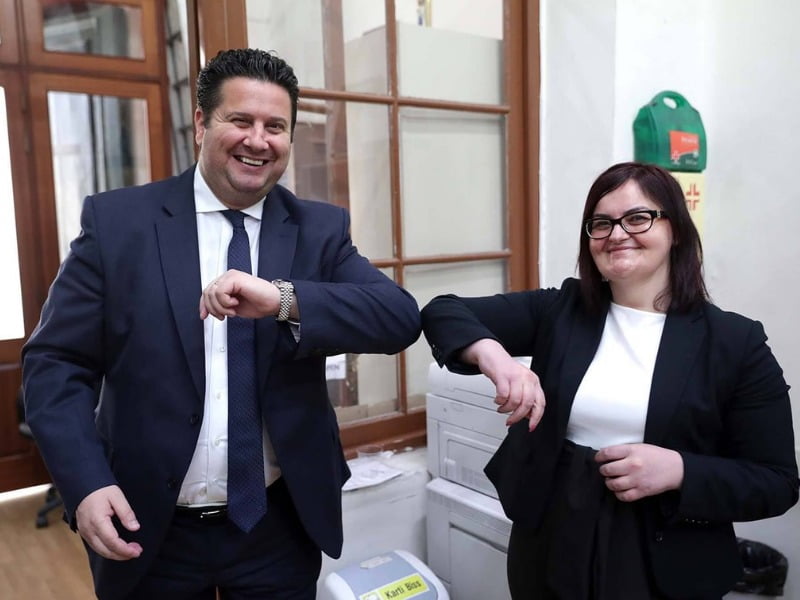Attorney General (AG) Victoria Buttigieg sits on the body that is set to investigate Yorgen Fenech’s lawyers over bribery allegations, and her presence, which is in breach of the law, may undermine proceedings against the lawyers, including any potential prosecutions that may be brought by her office in the criminal court.
The lawyers, Gianluca Caruana Curran and Charles Mercieca, who are defending the alleged mastermind in the assassination of journalist Daphne Caruana Galizia, are facing probes by the police as well as separate proceedings by the Committee for Advocates and Legal Procurators, a subcommittee of the high level Commission for the Administration of Justice.
The Committee, which investigates breaches of the code of ethics, can go as far as handing down a sentence to suspend or revoke a lawyer’s warrant. Its proceedings are held in secret and its findings are not published.
Of the five members who sit on the Committee, one is appointed by the Commission, three by the Chamber of Advocates, and the fifth is “appointed by the Attorney General”. Victoria Buttigieg was appointed to sit on the Committee by former Attorney General Peter Grech, but she has remained on the Committee after being appointed AG herself two months ago.
Legal sources consulted by The Shift expressed surprise that she did not resign from the Committee upon her appointment as AG. All agreed that her presence is in breach of the law, and that it could be used to challenge an eventual judgement or stultify proceedings.
Although a provision in the Constitution holds that “proceedings” of any Commission shall remain “valid” even if a member of that body should not have participated in the proceedings, the constitutionality of that provision itself could be challenged given the sensitivity of the AG’s role as chief prosecutor.
This is compounded by another complication that could arise if the lawyers had to be prosecuted by the AG’s office following the police investigation. The lawyers could challenge the prosecution on the basis that the AG, unless she would have abstained or resigned from the Committee, would have been privy to details in separate, secret proceedings before the Committee that would give the prosecutor an unfair advantage in an open court.
This could be at odds with two human rights principles – on fair hearing and equality of arms.
The Committee’s proceedings are held in secret, in part to enable the Committee to hear evidence on certain privileged information that would not ordinarily be admissible in an open court.
The Committee has the power and procedure of civil courts, even if findings are not published. A backlog of cases means that proceedings usually take considerable time to commence and run their course.
The Times’ journalist, Ivan Martin, is expected to be summoned to appear before the Committee since his testimony, taken under oath and subject to cross-examination, is the prime piece of evidence.
Sources have told The Shift that one of the things on the table during the meetings between Martin and the lawyers was a leak of an alleged recording of a phone call between ex-commissioner of police Lawrence Cutajar and Edwin Brincat, a confidante of self-confessed middleman in Daphne Caruana Galizia’s assassination plot. The recording had allegedly been secretly made by the Malta Security Services.
In recent months, in the compilation of evidence against Fenech, the defence lawyers have been making much of the contact between the ex-commissioner and Brincat, highlighting discussions between these two to question the credibility of Theuma, as well as the integrity of his presidential pardon. Theuma’s testimony is pivotal to the prosecution’s case.
According to the information given in The Times’ statement, Martin had met the lawyers then wrote and sent them the draft text of the article “to confirm details of information which Fenech’s legal team had provided during a previous meeting”. He met them again, which is when the bribe was allegedly offered.
Journalists do not normally show draft articles of this type to such sources. And criminal lawyers, if they have evidence in favour of a client, do not normally resort to the media instead of raising it in court or going to the police.













Incredible. The AG sits on a committee she should not be on to ensure a loophole that can be legally challenged.
Par for the course in today’s Malta.
I am starting to believe that the last statement by Daphne before being assassinated about ‘crooks being everywhere’ is proving to be an understatement. Hard to fathom, but true in reality
Oh, man these two. Tiktok